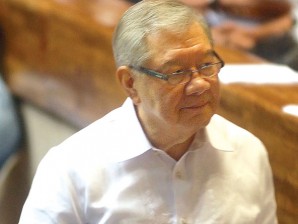Anti-trust bill among economic measures to occupy 16th Congress—Belmonte

Speaker Feliciano Belmonte: We did well. INQUIRER FILE PHOTO
MANILA, Philippines — Speaker Feliciano Belmonte Jr. said the 16th Congress would tackle a slew of economic measures, including the anti-trust bill aimed at stopping monopolies and fostering fair competition.
Belmonte said on Tuesday that Congress would try to work on legislation that would help ensure “inclusive” economic growth or growth in which the benefits of progress trickle down to the masses.
Belmonte was a co-author of the anti-trust bill in the 15th Congress, and his support for the measure is expected to continue.
“The anti-trust [bill], promoting competition, stuff like that, we are fine-tuning it. Those will be our focus,” Belmonte told reporters when asked what could be expected from the 16th Congress.
Other economic measures could also be on the table, he said.
Article continues after this advertisement“Everybody’s talking about inclusive growth. We want to see what can be done really to promote that,” he said.
Article continues after this advertisementThe anti-trust bill had moved forward in the 15th Congress, hurdling the usually contentious vote on second reading in 2011.
But this approval was reconsidered a few days later in order to give lawmakers more time to interpellate the sponsors and introduce individual amendments. The bill never moved forward from this stage.
The anti-trust bill aims to penalize anti-competitive agreements, the abuse of a dominant position, and anti-competitive mergers. It also seeks to establish the Philippine Fair Competition Commission.
Anti-competitive agreements include price fixing and bid rigging, while acts considered abuse of a dominant position include predatory behavior toward competitors, limitation and control of markets, price discrimination, and market allocation.
The bill makes it a state policy to promote and enhance economic efficiency and free, full, and fair competition in trade, industry, and commercial economic activities. The state should also prevent the concentration of economic power in a few persons who threaten to control the production, trade, or industry in order to stifle competition, manipulate free markets, or increase market prices.
These are intended to protect consumer welfare and advance domestic and international trade and economic development.
The proposed Philippine Fair Competition Commission would have the power to investigate motu propio any reported violations of the law as well as other competition laws, and to issue cease and desist orders.
It can also file civil complaints for damages to business or property of the state, and impose administrative fines.
The fines for violating the proposed anti-trust law range from a minimum of P10 million to a maximum of P750 million. Other, much lower fines could also be imposed for violating an order of the commission or providing incorrect information.
Meanwhile, Majority Leader Neptali Gonzales II said he expected the administration to make economic measures a priority in the 16th Congress, and he expressed hope these bills would be identified and introduced early so that lawmakers could start working on them right away.
Gonzales said bills tackled during the first or second year of the 16th Congress would have a greater chance of avoiding the political maneuverings expected in the 12 months leading to the 2016 presidential election.